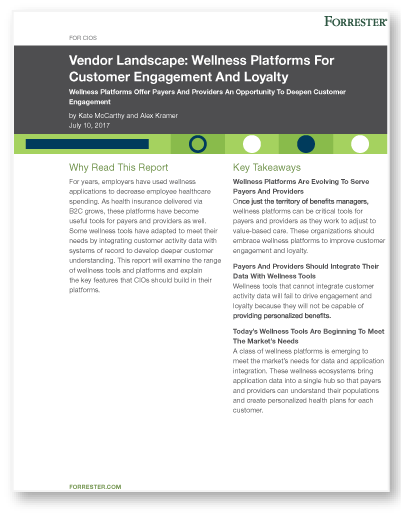Technology is leading the charge to shape the future of healthcare and health engagement is at the forefront of that change.
As data becomes more centralized, we’re seeing quantitative results that prove a stronger focus on wellness as part of activity-based health engagement campaigns can drive healthcare costs down and more importantly, improve individual quality of life. At Icario we’ve seen empirical proof that the right technology platform can improve the results of wellness campaigns even further.
In the Forrester report Vendor Landscape: Wellness Platforms for Customer Engagement and Loyalty, research analysts also provide strong support for this point. The analysts make the case that wellness should be considered a primary component of any strategy focused on driving increased consumer engagement in healthcare programs. They reinforce that any health engagement platform needs to have certain key capabilities for the campaign to be successful.
Here are 4 takeaways from Forrester’s report that should be considered as part of any health engagement strategy:
1. Health engagement platforms need to integrate data from every component of healthcare.
Many consumers use an app or wearable technology that tracks fitness, diet, sleep, mental health, or other measurements relevant to their health and daily habits. On the other side, health plans and providers have health histories of their members and patients that contain invaluable data.
Platforms and other technology focused on health engagement must be able to integrate all of this data to create a robust, personalized digital profile of the healthcare consumer. Predictive analytics can then indicate the best strategy for engagement campaigns that increase participation in activities like annual skin screenings and flu shots.
Aggregating that data can also help identify broader strategies for improving lifestyle habits of entire populations. Reduced costs to providers, and increased health of members are not the only benefits of a focus on data aggregation.
Forrester analysts point out that integrating wellness data with historical health data as part of an overall health engagement strategy will soon become a key competitive advantage for most payers and providers.
2. Personalization is a critical success factor for any health engagement campaign.
Healthcare consumers are bringing their personal expectations from retail experiences to their interactions with payers and providers. This includes a desire for personalized interaction and messaging. Increasing consumer engagement in healthcare programs requires the ability to create unique messages that are customized to the characteristics and behavior of an individual.
These messages also need to be delivered based on the preferences of the individual, whether those preferences are determined based on generational or other common characteristics, or on the member’s actual activity. Personalized messaging delivered according to the individual’s preference is crucial to improving the outcomes of action-based campaigns.
3. Rewards should be an important part of health engagement strategy.
Health engagement platforms driving the most successful consumer engagement in healthcare are those that reward and motivate members for new participation or an increase in the desired behavior. However those rewards cannot be a “one size fits all.”
Once again, personalization is necessary to tailor the rewards that are most meaningful to the individual healthcare consumer. Forrester’s research shows that the more personal the reward, the more the healthcare consumer is apt to demonstrate loyalty.
Using the right communication methods and providing effective incentives customized to the preferences of the member will make a huge difference in the participation and engagement of the group as a whole. The result is higher ratings, reduced costs, and of course, healthier people.
4. Platforms should incorporate advanced technologies to manage data and drive greater personalization.
As data becomes more aggregated and more information is available regarding each and every individual member and patient, healthcare organizations need help managing and using that data to its best advantage.
Any health engagement or wellness platform must have the capability to incorporate advanced technologies like Artificial Intelligence (AI) and Natural Language Processing (NLP) to their best advantage.
Using AI to predict the right timing and sequence of messaging, for example, can finetune previously noted preferences. NLP can help those messages use the right words that will resonate with a particular individual.
At Icario, we’ve always believed that health engagement should reinforce actions that benefit the entire spectrum of health from wellness to illness. This Forrester report drives home that point, and provides further insight into why wellness is becoming such a major factor within health engagement.




